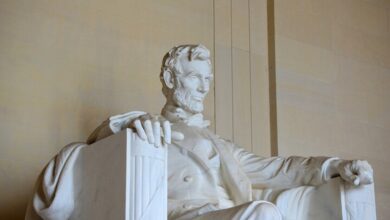Hamilton: a brilliant and inspirational story that makes us fall in love with history

When we kids of a certain age first learned about the Founding Fathers in elementary school, we could be forgiven if they all sort of blended together in a torrent of knee-length stockings and powdered wigs. Oh, we learned the names of most of them. We saw their pictures on our money. Maybe we learned that George Washington wore false teeth, Thomas Jefferson invented the first swivel chair, and John Adams was kinda short. And then there’s Hamilton.
But few of us had much idea about who these historical leaders really were or what they believed. And what of Alexander Hamilton — the only guy in our wallets who had never been president? We learned nothing about him at all.
That was before Lin-Manuel Miranda penned Hamilton, a raucous, rap-inflected, rapturiously received musical that doubles, oddly, as a very lively history lesson. In the musical, Washington is not just the face on a dollar bill, but a passionate general and a measured, introspective statesman. Jefferson’s a bit of a dandy who loves his country almost as much as himself. James Madison is sickly and pompous; Aaron Burr’s an empty suit. Now the musical is playing on Disney+. Grab someone who has the streaming service and watch it.
If the word Broadway means anything to you, you likely know about Hamilton’s place in the modern musical pantheon. Inspired by Ron Chernow’s outstanding 2004 biography Alexander Hamilton, the musical’s been a rolling phenomenon since Lin-Manuel Miranda’s creation first landed in an off-Broadway theater back in 2015. In 2016, when it moved to the Great White Way, Hamilton nabbed a record-setting 16 Tony nominations (winning 11 of them) and earned that year’s Pulitzer Prize for drama.
And then we come to Alexander Hamilton himself: born out of wedlock in the Caribbean. Orphaned before he had his first shave. Hamilton was a penniless nobody who, by dint of his own brilliance and ambition, became one of the foremost authors of the American experiment. He’s not just stamped on the $10 bill. His fingerprints are everywhere, even in modern America. And though his critics called him a English-loving monarchist (fighting words back in those days), he was, and is, the Founding Fathers’ best example of a self-made man.
Oh, the dude had some failings, too. He made his share of enemies, and in the end he died because of it.
But that comes later in Miranda’s musical. And this review has barely begun.
The character of the United States is built on a powerful sense of self-determinism: If we’ve got the talent and the work ethic, we tell ourselves and our children, we can become anything we want. Some might argue how true that truism really is, but there’s no question that it was first embodied by Hamilton. And Miranda’s rendition emphasizes that ideal again and again.
Hamilton is Hamilton’s hero, and we see his willingness to take sometimes controversial stands on the issues of his day. He rails against British rule as the Revolution begins to stir. After the revolution, he advocates for a strong centralized government and pushes that government to take on states’ wartime debts. Toward the end, he waxes philosophic about his legacy. “It’s planting seeds in a garden you never get to see,” he tells us.
Though dramatically ambitious, Miranda’s Hamilton has his eye fixed on history, too. He’s in a position to plant seeds for a promising young nation, a “place where even orphan immigrants can leave their fingerprints and rise up,” and he’s determined to give that nation the very best chance to grow and flourish. Here, Hamilton’s story and the ideals on which the country is based are deeply entwined.
But if you’re looking for heroes here, perhaps a better example would be Hamilton’s wife, Eliza. We’re often told how gentle and kind and giving she is — and, as we’ll see, forgiving, too. And as the musical comes to an end, Eliza offers both a eulogy and a recitation of how she carried on her husband’s legacy while burnishing her own: raising funds for the Washington Monument; fighting against slavery; establishing the first private orphanage in New York; tirelessly advocating for her late husband’s place in history.
We find other heroes, too. Washington, so often locked in history as a marble statue, comes across as a passionate, deeply considered statesman here — doing not only his best to win a war but get a country off on the right foot (despite having the warring geniuses of Hamilton and Jefferson in his cabinet). Eliza’s sister, Angelica, proves to be both loving and sacrificial. Hamilton’s wartime friends John Laurens, Hercules Mulligan and the Marquis de Lafayette all fight and risk a great deal for the fledgling country, with one of them offering up the ultimate sacrifice.
Hamilton isn’t shy dabbling in the faith that was central to many of the founding fathers, warts and all. The musical sporadically references God, faith and religion, with those spiritual sentiments growing more heartfelt as the production unfolds on stage.
When Washington is set to retire from public life after 45 years of service, he pointedly tells Hamilton that he’s doing “like the Scripture says: Everyone shall sit under their own vine and fig tree/And no one shall make them afraid.” (It’s a reference to Micah 4:4, and the real George Washington often used the phrase in his own correspondence.)
In one poignant moment, Hamilton experiences a family tragedy, and he finds himself praying outside a church. “That never used to happen before,” he marvels. During a duel, Hamilton says that he can get a “glimpse of the other side” and the people who wait for him there. Eliza talks about how “the Lord in His kindness” allowed her to live for several decades after her husband passed, giving her more time to talk about him and to continue, as she thinks of it, his good work.
Hamilton isn’t perfect. It gets some history wrong, fabricates important scenes and often has the feel it was written specifically for a New York audience.
I get the appeal.
As I suggested at the top of this review, the history of the United States’ critical formative years, and the lives of its founders, can easily get lost, with the major players locked in marble. Rarely can we feel the breath of that time, the heat, the audacious idealism of the American Experiment.
Hamilton, through its multi-ethnic cast and contemporary rap-musical beats, smashes that marble and transports us into a time when a strange collection of people harboring wildly new thoughts of self-governance rocked the world, putting a brilliant, prickly underdog at its core. And while it takes a few liberties with the history, it’s both far more memorable and urgent than a semester of lectures.
But we can’t forget that when Miranda brought Hamilton into the 21st century, he slathered on some very 21st-century issues. Hamilton’s sexual dalliances are a matter of historical record; the pelvic thrusts and tawdry allusions are purely of the here and now. The language is refreshingly contemporary but often crude, too. Even if Washington and Hamilton used this sort of language behind closed doors, I doubt they would’ve approved of its use before a theater full of people — much less a streaming television audience of millions, including children.
This Disney+ filmed version of the musical features Hamilton at its 2016 peak, with Miranda himself playing the title role. It’s educational, entertaining and, in this fraught time when the American Experiment can seem a little wobbly, inspirational. The problems and fights back then echo our conversations now. If they figured out how to overcome those difficulties more than two centuries ago, why can’t we?
–Paul Assay | PluggedIn









